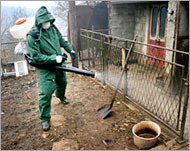WHO: Bird flu risk unprecedented
Bird flu, feared as the source of a possible human flu pandemic, is unprecedented in scope as an animal disease, the World Health Organisation says.

The body is urging nations to sharpen their plans for preventing widespread disease among people.
The UN Food and Agriculture Agency, meanwhile, criticised Western nations for being slow in responding to the latest outbreak, which started in Asia in December 2003.
The comments came at a meeting of health experts in Geneva, Switzerland.
Dr Margaret Chan, who is spearheading WHO’s efforts to prevent bird flu from infecting humans, said that since December 2003 more than 160 million poultry birds have been killed by the disease or slaughtered to prevent its spread in Asia alone.
“The outbreak in poultry is historically unprecedented,” she told the meeting of more than 30 experts.
She said bird flu posed a greater challenge to the world than any previous emerging infectious disease.
“The cost to agriculture has exceeded $10 billion,” she said. “The livelihood of around 300 million farmers has been affected. No one can say when this will end.”
So far, the virus has remained primarily a bird disease, she said, but experts fear the H5N1 strain will mutate into a form that can easily infect humans. So far 174 people have been infected by H5N1, and 94 of them have died.
Serious disease
When humans do catch it, it is “a very serious disease affecting multiple organs,” she said.
The meeting was part of a series of efforts to prepare for the possibility of bird flu – or something like it – becoming global pandemic among humans.
|
“The outbreak in poultry is historically unprecedented” Dr Margaret Chan, |
The UN Food and Agriculture Agency, based in Rome, reportedly criticised wealthy nations for a slow response.
Jacques Diouf, the head of the agency, was quoted in the French daily Liberation as saying: “Governments have sinned by failing to look ahead and have a sense of solidarity.
“Developed countries thought that this was going on in Asia, that it was far away and that we were exaggerating the risks of the epidemic.”
They only began to respond when the flu reached Turkey two years later, he said.
Diouf reportedly recommended the reinforcement of veterinary services on the ground in affected countries and the development of cheaper, easier-to-administer animal vaccines.
Pandemics
Global flu pandemics – as opposed to annual recurrences of seasonal flu – tend to strike periodically. In the 20th century there were pandemics in 1918, 1957 and 1968.
 |
|
The disease has affected millions |
This is the first time world health authorities have tried to stop a pandemic before it begins.
“Sars has shown us how much the world has changed,” Chan said. “Sars showed that in a globalised economy, with high volume of international travel, vulnerability to new disease threats is universal. It is the same for the rich and for the poor.”
Sars (severe acute respiratory syndrome) started spreading in February 2003 and affected 30 countries, she said. There were 8000 cases of the disease, about 800 of them fatal.
“Sars caused a loss to Asian economies of at least $30 billion or $25 billion,” Chan said.
Defence strategies
But there are defences against the spread of viruses, including surveillance, containment and monitoring to make sure health officials have the best measures to fight it.
|
“Developed countries thought that this was going on in Asia, that it was far away and that we were exaggerating the risks of the epidemic…they only began to respond when the flu reached Turkey” Jacques Diouf, |
Maria Cheng, the WHO spokeswoman, said experts hope to isolate outbreak areas and to set up agreements to allow international health authorities to respond quickly with testing and containment measures.
The meeting discussed measures such as imposing quarantines, preventing contact with infected individuals and providing them with antiviral medicine.
Even if the pandemic cannot be stopped, WHO says such measures can buy time for health authorities to produce a vaccine.
“Concern has mounted progressively, and events in recent weeks justify that concern,” as H5N1 this year has affected wild and domestic birds in 17 new countries in Africa, Asia, Europe and the Middle East, Chan said.
Mutating
In Austria, ORF reported that two or three cats had tested positive for H5N1, according to Hans Seitinger of the agriculture authority in Styria state.
On Monday, Poland also reported H5N1 in two wild swans found dead last week in Torun, about 200km northwest of Warsaw.
Dr Mike Ryan, director of epidemic and pandemic alert and response at WHO, said: “We truly feel that this present threat and any other threat like it is likely to stretch our global systems to the point of collapse.”
The first priority was to prevent H5N1 from developing the ability to ignite a pandemic, Chan said. “Should this effort fail, we want to ensure that measures are in place to mitigate the high levels of morbidity, mortality and social and economic disruption that a pandemic can bring to this world.”